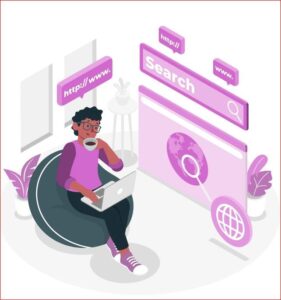A Beginner’s Guide to Building an Effective External Link Network
Blog | Sunday - 16 / 02 / 2025 - 5:30 pm
External links will help to improve your website’s ranking in search engines and increase its credibility. Building an effective external link network is one of the most important factors in achieving this. External links act as signals to search engines, indicating the quality of your website’s content, which helps improve its ranking and increase the number of targeted visitors.
In this guide, we will cover the concept of external links, their importance, types, and the best practices you can follow to build a strong link network that improves your site’s performance in search results.

External Links
Search engines
website
What are External Links?
External links are linking direct visitors from other websites to your site. These links are used to improve SEO by enhancing your site’s credibility with search engines like Google. When a high-authority site links to your site, it is considered a trust signal that increases your site’s power and boosts its chances of appearing in the top search results.
For example, if you have a fitness website and a popular fitness site like a training blog links to it, search engines will consider this proof that your site contains valuable content, thereby improving your site’s ranking in search results.
The Importance of External Links for SEO
- Improving Your Website’s Ranking in Search Results Strong external links are one of the main factors for improving your website’s ranking in search engines. In Google, websites are evaluated based on the number of external links pointing to them. Search engines consider these links as votes of confidence for your site, helping it appear on the first pages.
When you get links from reputable, trusted sites, it signals that search engines view your site as valuable and authoritative.
- Increasing Traffic, The more links your site gets from trustworthy sources, the more visitors it can attract. Visitors who click on links from other sites can bring traffic to your site, helping to increase its visibility and spread.
- Enhancing Credibility and Trustworthiness When your site receives links from credible sources, it makes your site appear more trustworthy to search engines and visitors. External links can help enhance your credibility and build a strong reputation for your website online.
- Faster Indexing of Your Site External links help search engines discover and index your site faster. When you receive links from other sites, search engines visit your site more frequently, leading to faster indexing of your pages in search results.
Types of External Links

External Links
Search engines
website
Before you start building an external link network, it’s important to understand the different types of links and their impact on your website:
- Do Follow Links These links are the most valuable type of external link as they pass SEO power to your site.
- They increase your site’s authority.
- They act as a vote of confidence for your site by search engines.
- It’s ideal to get these from high-authority sites.
For example, if a government or media site links to your site, it’s considered a “Do Follow” link, which boosts your site’s authority and positively impacts your search ranking.
- No Follow Links These links are less impactful for SEO than “Do Follow” links, but they still point to your site.
- They don’t pass SEO power to your site, so their effect on ranking is smaller.
- They are commonly used in comments and forums to prevent manipulation.
However, even though they don’t directly improve your ranking, No Follow links still contribute to the natural diversity of your site’s link profile.
- Internal vs. External Links
- Internal links connect pages within the same site to improve user experience and internal SEO.
- External links come from other websites and help increase your site’s authority and improve its ranking in search engines.
External links are the main factor in improving a website’s ranking in search engines, but you should maintain a balance between internal and external links to ensure optimal performance.
How to Build an Effective External Link Network

External Links
Search engines
website
- Create High-Quality Content The best way to get natural external links is by creating valuable content that is worth sharing. High-quality, unique content that answers visitors’ questions in detail and adds value is more likely to attract other sites to link to it.
Ensure your content contains unique information and innovative research. Content that offers fresh insights is often well-received and more likely to be linked to by other sites.
- Reach Out to Website Owners Find websites related to your field and offer them valuable content that could benefit them. You can contact them and suggest adding a link to your site in their articles in exchange for valuable content or mutual collaboration.
You may need to tailor your messages for each site, explaining how they will benefit from adding your link. Make sure your message is professional and concise to avoid appearing as if you’re just seeking to build links for personal gain.
- Guest Blogging Writing articles for other websites is one of the best ways to get external links. Provide valuable content that is well-researched and supported by credible sources. Within the articles, you can naturally add a link to your site without overdoing it.
This method is great because you’re exchanging value with the host site. Your articles should be of high quality to encourage readers to return to your site for more content.
- Submit Your Site to Directories and Reference Websites Many directories and reference sites allow you to add your link. Some of the most important ones include:
- Local business directories that improve your visibility in local search results.
- Review sites that allow you to get links from trusted reviews.
- Specialized article directories target audiences interested in your site’s content.
When submitting your site to these directories, ensure they are reputable and of high quality. Avoid submitting your site to unreliable or suspicious directories.
- Use Broken Link Building Strategies This method involves finding broken links on other sites and reaching out to the site owners, suggesting replacing the broken link with one that leads to similar content on your site.
You can use tools like Check My Links to search for broken links on related websites and then send a message to the site owner offering alternative content. This strategy is a win-win because it improves your site while solving the problem of broken links on other sites.
- Share Content on social media Regularly posting content on platforms like Facebook, Twitter, and LinkedIn increases the chances of receiving external links. The more engaging and impactful your content is, the more likely other sites and influencers in your field will link to it.
Build a strong presence on social media and share engaging content that captures your audience’s attention.
- Analyze Your Competitors and Their Strategies Use tools like Ahrefs or SEMrush to discover the backlinks of your competitors, then try to obtain links from the same sources.
- Create Shareable Content Create visually appealing content such as infographics, educational videos, and in-depth research that are more likely to be shared across the internet.
Best Tools for Building and Analyzing External Links

External Links
Search engines
website
- Ahrefs: Helps in analyzing external links and identifying your competitors’ backlink sources.
- Moz Link Explorer: Provides data on link strength and authority.
- SEMrush: A comprehensive tool for backlink and keyword analysis.
- Google Search Console: This can be used to monitor the external links pointing to your site.
Mistakes to Avoid When Building External Links
- Buying Paid Links Purchasing paid links can lead to penalties from Google. You should obtain links naturally through effective strategies.
- Relying on Unnatural Links Avoid placing your links on low-quality or spammy sites. Links should be credible and related to your content.
- Using the Same Anchor Text Repeatedly Try to vary your anchor texts. Overusing the same anchor text can be considered unnatural by search engines.
- Overpotting Links in Comments and Forums Google may consider this link manipulation, which could negatively impact your site’s ranking.
Building an effective external link network is not a random process; it requires a clear strategy and ongoing effort. By focusing on creating valuable content, connecting with relevant sites, and using best practices, you can improve your site’s ranking and increase its credibility.

External Links
Search engines
website
If you’re looking for comprehensive SEO services to help improve your site’s ranking quickly and effectively, Boost and Rank is the ideal choice for you. With our specialized SEO services and external link-building solutions, you can achieve guaranteed results that help elevate your position in search results. Don’t hesitate to visit our site today and start your journey toward digital success!
Start implementing these strategies today and watch your site’s results improve over time.




